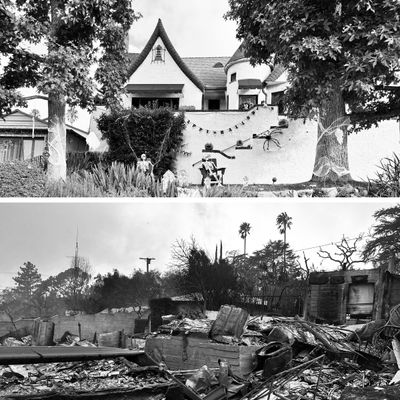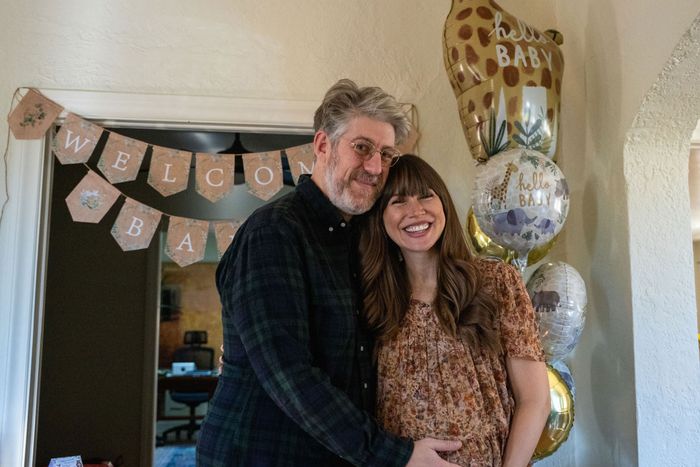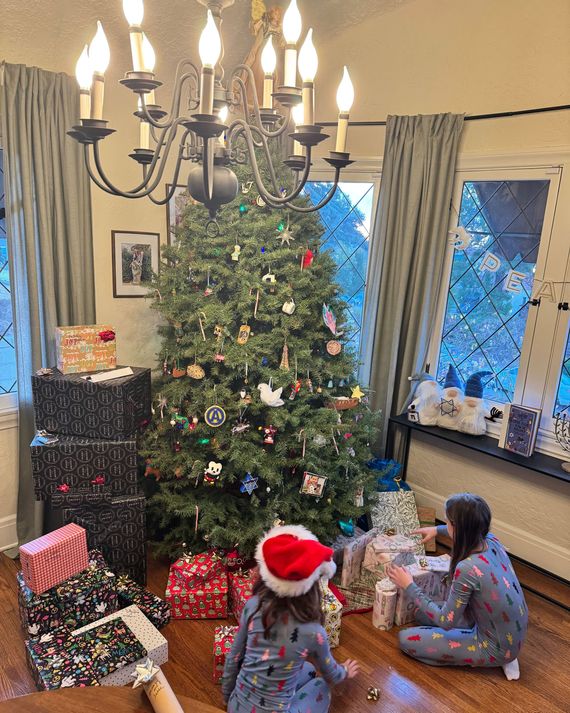
At 38 weeks pregnant, Emily Davis thought all she’d focus on was having a safe and healthy birth. Instead, the 40-year-old therapist and her family are navigating the nightmare of losing everything after the Eaton fire — one of the many wildfires currently ravaging Los Angeles — destroyed their home last week. The scale of the devastation is still hard to grasp: Since the Palisades wildfire and other blazes began on January 7, at least 24 people have been killed, thousands of buildings have been destroyed, and entire communities have been uprooted. Especially hard hit have been the historically Black neighborhoods in Altadena, the community where Davis has lived for nearly three years with her partner, Jesse Kahn, and her 11-year-old daughter and 9-year-old son.
Pregnant people, as well as new parents and their children, are especially vulnerable during natural disasters; some organizations supporting victims of the California fires have focused on providing new parents with essentials such as diapers and formula. As she approaches her due date, Davis spoke with the Cut about how she’ll navigate bringing a newborn daughter into an unstable housing and environmental situation.
What brought you to Altadena?
We moved in 2022. What brought us there is the community. I’m from Atlanta, and that is a defining part of who I am — Altadena is the first place I felt that reflected back to me. We finally felt like, “Okay, let’s expand our family. Let’s get settled. Let’s dig our heels into L.A.” The neighbors were so welcoming: coming over, dropping off Christmas gifts, inviting each other over for Halloween. In addition to that, there’s so much diversity and that has made me feel more at home. There were these establishments that have been there for so long and treat you like family. Altadena Hardware was a place that we went to every time we were like, “Oh, we need batteries.” The fact that it’s not there anymore, it’s so heartbreaking.
How did you learn about the Eaton fire? What was evacuating like?
The wind was so wild. It sounded and looked like a hurricane with no rain. Our furniture outside was blown around, and I was afraid stuff was going to fly through the windows. On Tuesday night, we could see the fire outside our front door. That is what made us leave. We knew how strong the winds were, and we knew what was going on with Palisades. We were terrified, so we got in the car and drove south. While we were driving, we said, “Let’s just get a hotel room downtown for the night and hopefully the winds blow the other way.” We were wrong. On Wednesday, when we woke up — well, we barely slept, but when we started our day, we were constantly checking online and reaching out to neighbors, like, “Do you know if our house is still there? Are you still up there? Is your house still there?” In the afternoon, our neighbor sent us a video of where our house used to be.
We just lost it. We did not grab any of our meaningful belongings, and I’m not even sure I would’ve had the wherewithal to grab the things that I’m grieving right now. People often say, “It’s just stuff. At least you have your life.” I am grateful that we are alive, and I’m grateful that we’re supported by so many people. But there are a lot of things that are not replaceable. They randomly go through my head, and it’s a sucker punch. I fall apart thinking about these pieces of art that my children created through the years. I know I still have the artists, but they’ll never be 4 years old again.
Have you been back to the house since?
Jesse does not want to take me out there, but we also can’t get up there. They’re just not letting anyone up, especially to our little nook above Altadena Drive.
Where are you sheltering now?
We’re in an Airbnb, and we are moving to another next week. Hopefully, we will be there for a month, which gives us a little breathing room to find another lease. But moving when you’re this pregnant, and then moving again postpartum — it sounds awful but it has to happen. Space is very tight right now. There is outdoor space at the next Airbnb, though, so at least my kids will be able to run around. I am in a place of having to exercise a tremendous amount of acceptance when I think about what we had planned to bring our baby home to. It is someone’s Airbnb; it’s not a home. I just have to reenvision what it will be like when she’s here.
Has your birth plan changed at all?
I’m due on January 24. I don’t think any woman is usually like, “I hope my baby is late!” I might be the first. My children were both born six days late, so I’m banking on that pattern continuing. It would be nice to be in a better mental state. However, I do have a great birth team assembled. I’ve got my partner, a doula, and a midwife constantly checking in. The baby is healthy; I’m healthy. I do have to stay close to our chosen hospital, because that’s where we would go if there’s an emergency. A lot of people are leaving town because of the air quality, but we can’t. What if I’m in a car for two hours and I go into labor? That’s a much worse situation than wearing a mask.
In which other ways has it been hard for your pregnancy to be so far along during this disaster?
I have a lot of fears. It’s hard to grieve being so prepared for this baby, like having my nursing station set up. I don’t have that anymore. But I am so loved. My community in Atlanta and my best friends are taking charge. They’re creating a wish list of everything that I lost and reaching out to brands to ask, “Is there any way you can replace this?” They’re sending me pumps, bottles, and baggies. They’re reaching out to get us diapers and wipes. It’s a matter of relinquishing control and trying to stay as trusting and open as possible, which is very hard for me. I’m type A. Letting yourself lean on people, letting people love you — being vulnerable in that way is so hard. But the gratitude is profound. It is a counterbalance to the grief that we’re navigating, and it is the only thing getting us through.
How are your children handling the situation?
I have been putting on my therapist hat: I’m very honest, but age appropriate. I did not show them the video of our house, but I did tell them it was gone. They were wailing. I had them on either side of me, and I just rocked them and held them, which is hard when you’re 38 weeks pregnant. My daughter was hyperventilating, so I told her to just scream. It helped her body regulate. She’s very sentimental, and it’s heartbreaking to watch something remind her of a toy, a picture, or a card that she used to have. It’ll knock the wind out of her sails, and she’ll start sobbing. My son hasn’t cried since I initially told him, but he’ll think of something, say it out loud, and be really sad. Then he’ll start to move. He’ll want to bounce on the birthing ball that someone replaced for me or he’ll do his karate katas.
I’m grateful that people have donated stuffed animals to them. Until the day that I die I will hear in my head my son wailing, “Why didn’t you grab Slothy Wothy?” which was his favorite stuffy. My daughter is afraid to get attached to toys now. She said to me, “I’m so afraid to get new stuff. I don’t want to lose it again.” I held her and said there have been many times in my life I’ve had to start over. It does suck. But there are a couple examples where I’m really glad I started over here because I got this family.
You mentioned that people are leaving town. Are you considering relocating elsewhere after your baby is a few months old?
We love Altadena so much that the idea of leaving it, when we were so excited about our expanding family, is hard to fathom. We haven’t put a tremendous amount of thought into this because the baby is coming and we’ve been hyperfocused on how we can get settled now. Ideally, we would still be able to live near our community. It’s just sad to think it might be a while. We’ll see how this birth goes, what the baby’s like on the outside, and then we’ll see what they’re doing with schools. That’s when we’ll have some bigger decisions to make. I share custody of my kids with their dad, who’s also in Altadena. Though he’s been displaced for now, from what we know his house is still standing. That is a massive silver lining for the children, and we want to make sure we all stay close enough to continue to provide stability.
Would you talk a little bit about the financial impact of all this?
My partner is 45; I’m 40. That house was full of a collective 85 years of stuff — some of it is replaceable, but a lot of it is not. Most people don’t buy the replaceable stuff all at once. You’ve gathered your cookware, linen closet, and wardrobe over time. Now it’s all gone. I remember saving for three years to get a Dyson blow dryer, and now I don’t have one. With a new baby on the way, it feels extra hard. I won’t have any creature comforts. The first couple days I was thinking, I don’t even own a rubber band. I can’t put my hair up. I don’t have underwear, I don’t have nursing bras. I need chapstick and I don’t have it, and I don’t have a purse to go look in. You have these realizations every second of the day, and the cost adds up so quickly. And it’s not just the cost for one person; it’s four and a half people, plus our pets.
What has been the hardest part of all of this for you and your family?
It’s so overwhelming juggling the logistics of getting insurance claims filed, applying for FEMA, and understanding all of this. Both my partner and I keep saying to each other, “I can’t think straight.” We can’t remember what we filled out versus what we haven’t filled out. Having to do that while holding space for our and the kids’ grief — the wind gets knocked out of us all day. It catches you off guard when a memory flashes through your mind. I can’t look at my camera roll. I can’t look at pictures of Christmas. Having to experience the grief while also taking care of business is a hard tension to navigate.
This interview has been edited and condensed for length and clarity.




